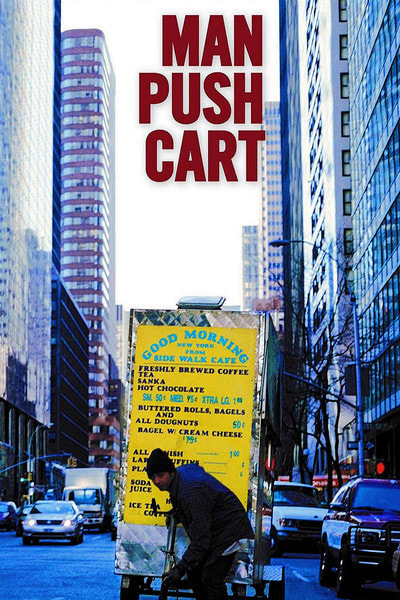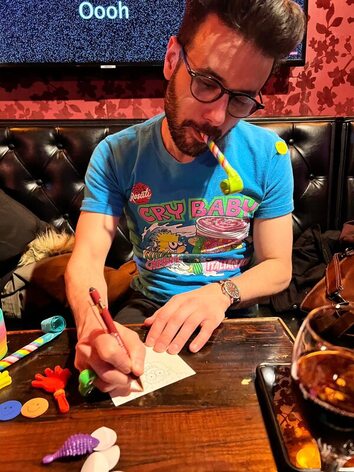|
by Michael Seymour Blake This is one of the only movies set in NYC that made me feel like I was heading to an unglamorous, low paying job. I worked a crappy office job in Times Square for over ten years. It’s all here: the slight filth on everything, the rumbling of engines and clamor of horns, the patter of hurried footsteps, the myriad of expressive faces and voices. You can smell the sewers, sweet pastries, and hot coffees. But there’s other factors as well—the texture, weight and general NYC vibe shine through in a way that will feel familiar to the daily grinders out there. Working with a limited budget, director Ramin Bahrani and cinematographer Michael Simmonds capture it all with an honest, simple, naturalistic style. And they depict our weary-but-determined protagonist’s struggles with just as much honesty and care. One of the reasons Man Push Cart feels so authentic is because some of the people you see, even those with speaking roles, don’t actually know they’re being recorded. Like when Ahmad (whose actual name is Ahmad Razvi) tries to sell bootleg porno DVDs to a man who turns him down because, he says, he can find them much cheaper in Brooklyn. This interaction was not in the script, and the man is not an actor. What we see here is an authentic response from a New Yorker who had no idea he was being filmed (of course they told him afterwards). Even a few of Ahmad’s (the character’s) friends are Ahmad’s (the actor’s) friends. One of his pals—a lively, confident man called Duke (Farooq “Duke” Muhammad)—bursts into a rap at a karaoke bar. Although he knows he’s on camera, what we’re watching is pretty much the actual Duke. There are scenes in a cart garage where it’s business as usual in the background, just real New Yorker’s doing their thing. Strengthening the realism even more is Ahmad’s (the actor—this is getting old now) lived experience as an actual cart vendor. Man Push Cart follows Ahmad, a Pakistani immigrant who works in a stainless steel coffee cart which he has to lug to and from a garage every day. He’s quiet, and it’s clear there’s a lot of mental/emotional turmoil whipping around his insides. He’s been scraping by for a while. Most people know him as the guy they buy their bagels from, but back home he was a rockstar. Why he ended up in a cart in NYC is left a little ambiguous. In the context of the story, it doesn’t even matter. He’s here. We’re with him now. His wife died, leaving him with a child he’s been estranged from. All that’s left, it seems, are damaged familial relationships and his cart. He sells crappy DVDs to make some extra side cash. One day, he meets Mohammad (Charles Daniel Sandoval), a successful man from a very different kind of NYC. Mohammad recognizes the former rockstar and claims he can help him get back on his feet. Ahmad also befriends a young, Hispanic newspaper vendor named Noemi (Leticia Dolera). A potential romance begins to develop between them. I won’t say more about where it all leads, but I was relieved when the movie ended with the same gritty, realistic voice it opened with. Ahmad’s cart takes on mythic qualities, looming like the carcass of some silver-scaled dragon he’s been cursed to haul around (or, more obviously, a Sisyphean boulder). It’s grueling to watch him shove, pull, and push the burden that is also his livelihood. I kept wishing I could run over to help. Even when the cart is stored at the garage, he must remove the gas tank and take it with him. There’s no escape from the burden that drains him of energy but grants him life. The expressions “Good morning” and “Have a nice day!” are printed on the cart. Albert Camus would love all of this. I was just as interested in Ahmad’s enervated face as the camera was. I think this is the first time he’s ever acted, yet he shows impressive restraint and natural talent. His character is damn exhausted, a shadow of his younger self. But like the tiny dinosaur sticker on his otherwise-unremarkable cart, an ember still burns somewhere within him. Or is it just a decaying relic? We get to travel with Ahmad into nice apartments and fancy clubs, places he navigates like they were different countries altogether. Some pretentious guy even patronizingly tells him to “fake it till you make it!” I know people like this—out of touch, smug, assuming they have all the answers for everybody’s problems. I’m not sure why, but my favorite scenes involved Ahmad organizing his cart for the day; the morning routine of stacking cups pre-filled with tea bags, placing the bagels and sweets in the display, and lighting the gas. It’s those little moments that drew me in. Maybe because I’m all too familiar with mundane morning setups. It’s refreshing to watch a movie about the working life that doesn’t romanticize, idealize, or pound our faces in with spoon-fed ideology. Many movies attempt this, and although their heart is in the right place, they often end up deflating the intended message. That’s not to say the movie doesn’t have an opinion. It’s just skillfully presented to us. We are shown the absurdity of existence and left to draw our own conclusions. I won’t spoil the ending, but I will say it left me contemplating whether the physical presence/absence of the cart matters as much as what it represents—the drudgery and toils of the working life. If it ain’t one thing, it’ll be something else, eh? Ahmad has hope, otherwise he wouldn’t be pushing forward despite everything. But how deep is that hope? What is driving him to continue? Many of us carry this same question. Why bother? What’s the point? Man Push Cart might reply, “because what else is there besides nonexistence?” “Is one to die voluntarily or to hope in spite of everything?” -Albert Camus, Myth Of Sisyphus.
Comments are closed.
|
AuthorOur fabulous blog team Archives
June 2024
CategoriesAll 12 Songs Art Art And Athletes Book Review Chorus Blog Date This Book Game Of Narratives Guest Blog Letter From The Editor Lifehacks Movies Of 2019 Music Pup Sounds Smackdown Strive For 55 Summer Playlists |




 RSS Feed
RSS Feed